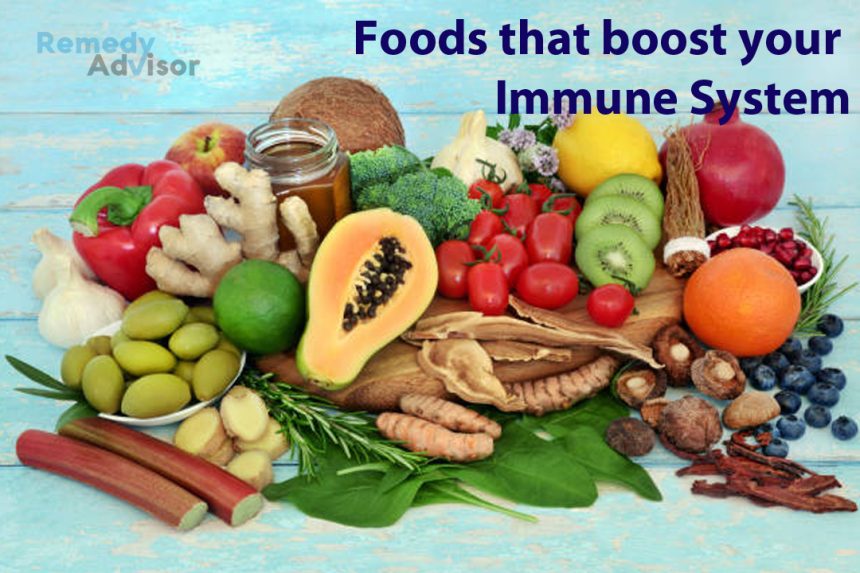For you to stay healthy and to recover quickly from illness your immune system must be healthy, too.
What can you do to optimize immune function? Exercise and stress reduction help. But evidence suggests that the most important contributor to immune function is what you eat.
The antioxidant shield
By now, you have perhaps heard about free radicals. These universal molecules cause cells to break down, speedy the aging process, encouraging heart disease and cancer and weakening the immune system.
There’s no way to evade free radicals. They’re produced inside the body as a product of normal metabolic procedures. But certain antioxidant compounds destroy free radicals.
• Vitamin E
This potent antioxidant forestalls the gradual decline in immune function brought on by aging. It boosts synthesis of antibodies and encourages reproduction of key infection-fighting cells called lymphocytes.
People who take vitamin E supplements mount a stronger immune reaction against invading viruses and bacteria. They also enjoy a reduced risk for cancer.
Good sources of vitamin E include whole grains, seeds and vegetable oils. Since it’s impossible to get enough E for full protection against free radicals from dietary sources, recommended daily supplement contain about 200 international units (IU) of vitamin E.
• Carotenoids
These antioxidants increase the numbers of lymphocytes and natural-killer cells. Supplements are available, but the best sources are fruits and vegetables especially carrots, kale, tomatoes and cantaloupes.
• Vitamin C
It energizes the immune system to react more vigorously to cancer cells and microbes. Diets rich in vitamin C have been linked to reduced risk for breast, colorectal and prostate cancer.
The optimal intake of vitamin C is 200 milligrams (mg) a day. You can get more than enough through your diet. Good sources of vitamin C include citrus fruits, cantaloupes and green peppers.
Caution: Larger doses can cause stomach trouble, kidney stones and in some people problems with iron metabolism.
Minerals
Minerals are needed for the synthesis of proteins, which are key components of all cells and enzymes in the body
• Zinc
The most important mineral for immune function, zinc boosts the number of lymphocytes and helps natural-killer cells attack cancer cells.
The average person needs 15 mg of zinc a day. Higher dosages seem to impair immune function.
One serving of fortified cereal (check labels) provides all the zinc you need. Meats (especially cooked oysters) and whole grains are also good sources. Zinc supplements generally are not necessary.
• Iron
An iron deficiency increases infection risk by weakening many different types of immune cells. Too much iron impairs immune function, too.
Women of childbearing age need 15 mg of iron a day. Men need 10 mg. Meats, beans and tofu are good sources.
Iron pills are a good idea only if a doctor has found you to be iron-deficient.
• Selenium
This mineral encourages growth of immune cells and stimulates production of antibodies.
Grains, nuts, seeds and fish are good sources of selenium. Because too much selenium can cause digestive and neurological problems, supplements generally are not a good idea.
Low-fat diet
Excess dietary fat impairs your cells’ ability to recognize viruses and bacteria, crippling your immune response. Even a diet that’s moderately high in fat (41% of calories) halves the cancer-killing ability of immune cells.
Self-defense: Limit your intake of all fats to 25% of your total caloric intake. For most people, this means 44 grams (g) to 55 g of fat a day.
Avoid whole milk (8 g fat per eight ounces), margarine (11 g per tablespoon), fatty meat (14 g in three ounces of lean ground beef) and nuts (18 g per ounce of pecans).
Immunity boosters
Research is beginning to confirm what traditional healers have long known that certain foods and herbs boost immune function
• Shiitake mushrooms
Studies in Japan show that these mushrooms can boost immune function and inhibit viral multiplication. In Japan, a shiitake derivative called lentinan is used as a cancer-fighting drug.
Shiitakes are tasty in soups, stews and vegetable dishes. Eat two to six shiitakes a week.
• Reishi mushrooms
These Chinese mushrooms boost reproduction of lymphocytes and trigger production of chemical “messengers” that coordinate immune system activity. Eat two to four reishis per week.
• Garlic
Garlic is a good source of selenium and of certain compounds with antiinfection and anticancer properties. Season food with garlic at least three times a week.
• Echinacea
This popular herb boosts the ability of immune cells to swallow up cells infected with viruses and stimulates production of compounds that coordinate the immune system’s response against yeast infections.
Echinacea extract should be taken for no more than three days in a row when you have a cold or flu, or feel one coming on. The usual dose is 30 drops of echinacea tincture, twice a day.







